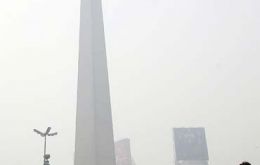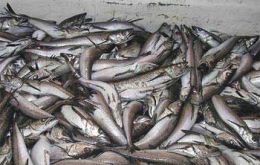MercoPress. South Atlantic News Agency
Stories for June 17th 2008
-
Tuesday, June 17th 2008 - 21:00 UTC
Spontaneous rallies surprise Kirchner and acolytes

Thousands of Argentines on Monday evening spontaneously and peacefully took to the streets in cities, towns and villages banging pans to protest against the government and demand the resumption of dialogue with the farmers, on their 97th day of conflict.
-
Tuesday, June 17th 2008 - 21:00 UTC
Outlook for hake in South Atlantic remains “worrisome”

The situation of common hake (Merluccius hubbsi) is extremely worrying in the South Atlantic as “low recruitment levels in the last three years are having an effect on the brood stock biomass” according to Argentina's Institute for Fisheries Research and Development (INIDEP) Research Director Otto Wohler.
-
Tuesday, June 17th 2008 - 21:00 UTC
US judge cuts 10 m off 12 m US dollars dog legacy
A judge in New York has agreed to slash 10 million off the 12 million US dollars inheritance given by real estate billionaire Leona Helmsley to her pet dog, Trouble.
-
Tuesday, June 17th 2008 - 21:00 UTC
Bank of England and Chancellor confirm higher UK inflation
Bank of England Governor Mervyn King has warned that inflation could rise above 4% this year as oil and energy prices soar. In an open letter to the Chancellor after official inflation hit 3.3%, Mr King said he had revised previous forecasts upwards due to a 15% rise in oil prices during the past month and the prospect of higher gas and electricity bills.
-
Tuesday, June 17th 2008 - 21:00 UTC
Lula da Silva and top banker determined to stop inflation

Brazilian President Lula da Silva and the country's top banker said fighting inflation remains a top priority, the latest warning against surging consumer prices. Speaking to an audience of investors at the Sao Paulo stock exchange, Lula da Silva said the government is determined to stop short-term inflation pressures from becoming permanent.
-
Tuesday, June 17th 2008 - 21:00 UTC
US Producer prices climb 1.4% in May, 7.2% in 12 months
Producer prices in United States jumped by more than expected in May pushed higher by the soaring fuel and food prices, according to the latest release from the US Labor Department.
-
Tuesday, June 17th 2008 - 21:00 UTC
Greater regulation for “speculation” in US and UK oil futures
The United States Commodity Futures Trading Commission and its United Kingdom counterpart reached a deal with ICE Futures Europe to impose regulations on West Texas Intermediate oil contracts that trade on the London-based electronic exchange within 120 days, CFTC chairman told the US Senate.
-
Tuesday, June 17th 2008 - 21:00 UTC
Argentines' inflation expectations for next 12 months: 34.7%
Argentines expect consumer prices to increase on average 34.7% in the coming twelve months, which is slightly lower than the previous report, according to the latest release from the Finance Research Center belonging to the Torcuato Di Tella Univeristy.
-
Tuesday, June 17th 2008 - 21:00 UTC
Farmers' conflict is costing Argentina 3.4 billion US dollars
The farmers' conflict is costing Argentina 3.4 billion US dollars, approximately 1% of GDP, but production and growth conditions in the country remain intact and are ready to resume in an excellent environment for food producing countries, according to economist Miguel Bein, a former Argentine Deputy Economy minister.
